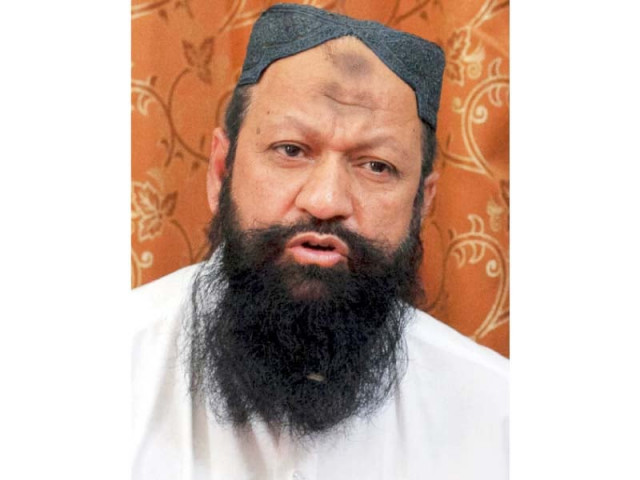Muzaffargarh gunfight: LeJ founder Malik Ishaq killed in ‘police encounter’
His deputy, two sons and nine loyalists also killed

Malik Ishaq. PHOTO: FILE
Malik Ishaq, the founder of Lashkar-e-Jhangvi (LeJ), a banned militant outfit blamed for some of the bloodiest sectarian attacks in Pakistan, was killed along with 13 others — including his two sons — in a ‘gunfight with police’ Wednesday morning.
Besides numerous sectarian attacks, the LeJ, long seen as close to al Qaeda and more recently accused of developing links with the Islamic State group, was also blamed for the 2009 attack on the Sri Lankan cricket team in Lahore.
Malik Ishaq, who had been in and out of police custody in recent years, was arrested along with six others on Saturday and was being moved when his loyalists attacked the convoy in Muzaffargarh, a senior police official said on condition of anonymity. “The police retaliated and in the encounter Malik Ishaq, his two sons and 11 others were killed, while six policemen were injured,” he added.
Officials from the Counter-Terrorism Department (CTD) of the Punjab police said 10 armed men riding motorcycles attacked the police convoy in the rural area of Shah Wala near Multan-Mianwali Road. Soon the attackers were joined by more gunmen from a nearby forest, the officials added. Police retaliated and a gunfight ensued which lasted for more than an hour.
When the shootout ended, 14 militants lay dead on the ground, six others were incapacitated, while some would-be rescuers managed to escape. A police official said the dead included six militants in police custody and eight of the attackers.
The fatalities were identified as Malik Ishaq, his two sons Usman Muawia and Haq Nawaz Omar, LeJ’s deputy chief Ghulam Rasool, his two sons Tehzeeb Omar and Zubair Muawia, and Zubair Tarmedi, Shafqat Omar Khan, Muzammil Saeed Jugnoo, Umar Abubakar, Arbab Khalid, Javed Sufiyan, Siraj Omar and Ilyas Abubakar. Ghulam Rasool acted as the group’s leader when Malik Ishaq — designated a global terrorist by the US State Department last year — was behind bars.
The shootout appears to have wiped out much of the top leadership of LeJ, a driving force in a rising tide of violence targeting the Shia community.
The casualties were driven to the District Headquarters Hospital Muzaffargarh which was virtually taken over by the commandoes of Punjab police. Media was not allowed access to the hospital, while outdoor patients were advised to travel to Nishtar Hospital in nearby Multan.
SSP Owais Malik, the district police officer, said he has no knowledge of any shootout, saying that he could only confirm the CTD took some terrorists to help the police identify other sectarian militants in Muzaffargarh and Dera Ghazi Khan districts. However, Punjab Home Minister Shuja Khanzada confirmed Malik Ishaq and “13 other sectarian militants, including two of his sons” had been killed.
The killings of Malik Ishaq and his cohorts are the latest blow to militancy in Pakistan, where in the past year authorities have cracked down hard on the myriad insurgent groups that have plagued the country for a decade. Security analyst Amir Rana said these killings would have a ‘major impact’ on the LeJ, effectively finishing the group as a force in Punjab.
Malik Ishaq’s killing triggered tension in his hometown of Rahim Yar Khan and some other districts of south Punjab, particularly Dera Ghazi Khan and Bahwalpur. In Rahimyar Khan, Malik Ishaq’s sympathisers attacked a police van and organised a vociferous protest outside his residence. The provincial government has alerted the police and ordered more security at Imambargahs across the province. The Shia community has been advised to temporarily suspend their religious gatherings for their own safety.
Born in 1959, Malik Ishaq had fought the Afghan jihad and joined the sectarian organisation Sipah-i-Sahaba Pakistan (SSP) in the 1980s upon his return from Afghanistan. However, he quit the SSP to form the LeJ in 1996. After the LeJ was outlawed by the government he joined the ASWJ but developed differences with its leadership after some time and subsequently formed his own group by the name of ‘Malik Ishaq Fidaayeen-e-Namoos-e-Sahaba.
He was accused of masterminding dozens of attacks against the Shia community. Imprisoned in 1997 after being arrested on charges of murder, death threats and intimidation, he was freed in July 2011. The LeJ has claimed responsibility for some of the bloodiest attacks on the Shia community in recent history, including two suicide bombings in Quetta in early 2013 that killed more than 180 people.
Published in The Express Tribune, July 30th, 2015.



















COMMENTS
Comments are moderated and generally will be posted if they are on-topic and not abusive.
For more information, please see our Comments FAQ